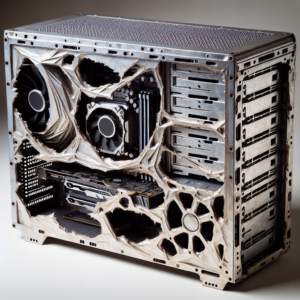Editor’s note: Omaha Computing Solutions does not sell gaming systems, but some newer  games can on some systems. You can always upgrade the video card possibly on some units. I run Crossover for Linux, and they have preconfigured containers (called bottles) that allow you run many Windows apps and games. Wine is a;so suggested here. but everything went more smooth with Crossover than it did with Wine (I really couldn’t get anything to run under Wine except very small single file programs).
games can on some systems. You can always upgrade the video card possibly on some units. I run Crossover for Linux, and they have preconfigured containers (called bottles) that allow you run many Windows apps and games. Wine is a;so suggested here. but everything went more smooth with Crossover than it did with Wine (I really couldn’t get anything to run under Wine except very small single file programs).
Switching from Windows to Linux doesn’t mean you have to leave your favorite games behind. Thanks to tools like Steam Play, Proton, and Wine, playing Windows games on Linux is easier than ever. This guide will walk you through the steps to get your games running smoothly on a Linux system.
Key Takeaways
- Linux gaming has become more accessible with tools like Steam Play, Proton, and Wine.
- Choosing the right Linux distribution can improve your gaming experience.
- Steam Play and Proton make it possible to play many Windows-only games on Linux.
- Wine allows you to run a variety of Windows applications, including games, on Linux.
- Regular updates and community support are crucial for a smooth gaming experience on Linux.
Understanding the Basics of Linux Gaming
Why Linux for Gaming?
Linux offers a unique gaming experience that many users find appealing. One of the main reasons is the open-source nature of the operating system, which allows for extensive customization. Gamers can tweak their systems to get the best performance possible. Additionally, Linux is known for its stability and security, making it a reliable choice for gaming.
Common Misconceptions About Linux Gaming
There are several misconceptions about gaming on Linux. Some people think that Linux is not suitable for gaming at all. However, this is far from the truth. While it’s true that some games may require a bit of tweaking to run smoothly, many popular titles are fully compatible with Linux. In fact, with tools like Proton and Wine, you can run a wide range of Windows games on your Linux system.
Popular Linux Distributions for Gamers
When it comes to choosing a Linux distribution for gaming, there are several options available. Some of the most popular ones include:
- Ubuntu: Known for its user-friendly interface and extensive support.
- Pop!_OS: Designed specifically for gaming and creative work.
- Linux Mint: Offers user-friendliness and often said to be very Steam friendly.
Each of these distributions has its own strengths, so it’s worth trying a few to see which one works best for your needs.
If you try to play any number of games, you will find that some can suffer small graphical quirks or decreased performance, while others won’t work at all. Others may require some web searches and command-line tweaking to get playable. However, once you have the basics down, you will be surprised at how many games you can get running.
Setting Up Your Linux System for Gaming
Getting your Linux system ready for gaming can be a fun and rewarding experience. Once you have the basics down, you’ll be surprised at how many games you can get running smoothly. Let’s dive into the steps to set up your Linux system for gaming success.
Using Steam Play and Proton
What is Steam Play?
For years, Linux users have relied on the ‘Wine’ compatibility layer to play Windows games. However, Valve has taken this a step further with Proton, a modified version of Wine built right into Steam. This means you no longer need to install Steam inside Wine to play Windows-only games. Proton is continually updated to improve game compatibility, making it easier than ever to enjoy your favorite titles on Linux.
Activating Proton on Steam
To enable Proton, go to Steam > Settings > Steam Play. Here, you’ll find two options:
- Enable Steam Play for supported titles – This allows you to download and play games that have been tested and confirmed to work with Proton.
- Enable Steam Play for all other titles – This lets you download and play any game using Proton, but keep in mind that these games are untested and may not work perfectly.
Configuring Proton for Optimal Performance
Once Proton is activated, you can tweak its settings for better performance. Some games may require specific configurations to run smoothly. You can find these settings under the game’s properties in your Steam library. Adjusting these options can help you get the most out of your gaming experience on Linux.
With Proton, the dark days of complicated setups are over. Now, you can easily play Windows games on your Linux system with just a few clicks.
Installing and Running Games with Wine

Wine is a compatibility layer that allows you to run Windows applications on Linux. It’s a powerful tool for gamers who want to play Windows-only games without leaving their Linux environment. Wine translates Windows system calls into POSIX-compliant system calls, which Linux can understand.
- Install Wine: Open your terminal and type
sudo apt-get install wineto install Wine on your system. - Install Winetricks: This is a helper script to manage Wine applications. Use
sudo apt-get install winetricksto get it. - Configure Wine: Run
winecfgin the terminal to set up your Wine environment. This will create a.winedirectory in your home folder where all your Wine configurations and installed applications will reside.
Once Wine is set up, you can start installing and running your favorite Windows games. Here’s how:
- Download the Game Installer: Get the .exe file of the game you want to play.
- Run the Installer: Navigate to the directory where the installer is located and run
wine installer.exe(replaceinstaller.exewith the actual file name). - Follow the Installation Steps: The installation process will be similar to what you would experience on a Windows system.
- Launch the Game: After installation, you can run the game by navigating to its directory and typing
wine game.exe(replacegame.exewith the actual game file name).
Wine might not support every game perfectly, but it has a large community and many resources to help you troubleshoot issues.
By following these steps, you can enjoy a wide range of Windows games on your Linux system without much hassle.
Exploring Lutris for Game Management

What is Lutris?
Lutris is an open-source gaming platform for Linux. It acts as a front-end for programs like Wine, RetroArch, and DOSBox. You pick the game you want to play, and everything required to get it working is downloaded and set up for you. Lutris supports games like League of Legends, Skyrim, Warframe, and Overwatch. It can even detect and add any Linux-native games you might already have installed and add them to the launcher.
Installing Lutris on Linux
To get started with Lutris, open it from your app launcher, click the search button, type in a game, and click the ‘Search Lutris.net’ button. You’ll get a list of games you can install, and double-clicking on it will display the ways you can install it. For example, The Witcher 2 can be downloaded from GOG for Linux, GOG for Windows, Steam for Linux, and Steam for Windows.
Managing Your Game Library with Lutris
Once you have all the necessary packages installed, setting up a game should be fairly simple. All you have to do is search for it in Lutris, click the Install button, and Lutris will prepare the game with the optimal Wine settings. It’s just the initial setup process that can be difficult and confusing.
Lutris is also great when playing older games, adding emulation, or installing a Windows game from physical media (if your gaming machine still has an optical drive). This will save you from installing emulators that are complete operating systems.
Lutris is a one-stop shop for all your games, with one-click install scripts that include all the necessary tweaks.
Dual Booting Windows and Linux

Benefits of Dual Booting
Dual booting allows you to enjoy the best of both worlds by having both Windows and Linux on the same machine. This setup is perfect for gamers who want to maximize their gaming options. You can run Windows-exclusive games on Windows and use Linux for everything else. Plus, it’s a great way to explore Linux without giving up on your favorite Windows games.
Setting Up a Dual Boot System
Setting up a dual boot system might sound complicated, but it’s quite straightforward. Here’s a simple guide to get you started:
- Backup your data: Before making any changes, ensure all your important files are backed up.
- Create a partition: Use a tool like GParted to create a new partition for Linux on your hard drive.
- Install Linux: Download a Linux distribution and create a bootable USB drive. Boot from the USB and follow the installation instructions, selecting the new partition for Linux.
- Install Windows: If Windows isn’t already installed, do so on a separate partition.
- Configure the bootloader: Use a tool like GRUB to manage your dual boot setup, allowing you to choose between Windows and Linux at startup.
Sharing Game Files Between Windows and Linux
One of the cool things about dual booting is the ability to share game files between the two operating systems. This can save you a lot of space and time. Here’s how you can do it:
- Use a shared partition: Create a separate partition formatted with a file system that both Windows and Linux can read, like NTFS.
- Symbolic links: Create symbolic links in your Linux home directory that point to your game files on the shared partition.
- Cloud storage: Use cloud storage services to sync your game files between Windows and Linux.
Dual booting is a fantastic way to get the most out of your refurbished laptops and refurbished desktop computers. It offers flexibility and ensures you can enjoy a wide range of games and applications.
By following these steps, you can easily set up a dual boot system and start sharing game files between Windows and Linux. Happy gaming!
Troubleshooting Common Issues
Dealing with Performance Problems
When gaming on Linux, you might face some performance issues. Optimizing your system can help. Start by checking if your drivers are up-to-date. Sometimes, adjusting the game’s graphics settings can make a big difference. Lowering the resolution or turning off some visual effects can help your game run smoother.
Fixing Audio Issues
Audio problems can be a real pain. First, make sure your sound drivers are installed correctly. If you’re still having trouble, try changing the audio settings in your game or using a different audio output device. Sometimes, using a USB headset instead of your computer’s built-in speakers can solve the issue.
Handling Game Crashes
Game crashes are frustrating, but there are ways to fix them. Start by verifying the game files through your game launcher. This can often fix corrupted files. If that doesn’t work, try running the game in compatibility mode or using a different version of Proton or Wine. Keeping your system clean and free of unnecessary files can also help prevent crashes.
If you’re still having trouble, don’t hesitate to reach out to the Linux gaming community for help. They can offer valuable advice and support.
Dealing with Performance Problems
When gaming on Linux, you might face some performance issues. Optimizing your system can help. Start by checking if your drivers are up-to-date. Sometimes, adjusting the game’s graphics settings can make a big difference. Lowering the resolution or turning off some visual effects can help your game run smoother.
Fixing Audio Issues
Audio problems can be a real pain. First, make sure your sound drivers are installed correctly. If you’re still having trouble, try changing the audio settings in your game or using a different audio output device. Sometimes, using a USB headset instead of your computer’s built-in speakers can solve the issue.
Handling Game Crashes
Game crashes are frustrating, but there are ways to fix them. Start by verifying the game files through your game launcher. This can often fix corrupted files. If that doesn’t work, try running the game in compatibility mode or using a different version of Proton or Wine. Keeping your system clean and free of unnecessary files can also help prevent crashes.
If you’re still having trouble, don’t hesitate to reach out to the Linux gaming community for help. They can offer valuable advice and support.
Community Resources and Support
Joining Linux Gaming Communities
Getting involved in Linux gaming communities can be a game-changer. These groups are full of people who share tips, solve problems, and celebrate victories together. Being part of a community can make your gaming experience much more enjoyable. You can find these communities on forums, social media, and even dedicated websites.
Using ProtonDB for Compatibility Reports
ProtonDB is a fantastic resource for checking if your favorite Windows games will run on Linux. Users share their experiences and rate how well games perform. This can save you a lot of time and frustration. Just search for the game you want to play, and you’ll get a good idea of what to expect.
Finding Help and Tutorials Online
The internet is full of tutorials and guides for Linux gaming. Whether you’re setting up Wine, configuring Proton, or just trying to get a game to run smoothly, there’s likely a guide out there to help you. Websites, forums, and video tutorials are all great places to look.
Don’t hesitate to ask for help. The Linux gaming community is known for being friendly and supportive.
Keeping Your System Updated

Importance of Regular Updates
Keeping your Linux system updated is crucial for a smooth gaming experience. Regular updates ensure that your system has the latest security patches, performance improvements, and bug fixes. This is especially important for gamers who need their systems to run optimally. Neglecting updates can lead to performance issues and even security vulnerabilities.
Updating Your Linux Distribution
Updating your Linux distribution is a straightforward process. Most distributions have a built-in update manager that notifies you when updates are available. Simply follow the prompts to download and install the updates. For those using command-line interfaces, a few simple commands can keep your system up-to-date. Here’s a quick guide:
- Open your terminal.
- Type
sudo apt updateto refresh the package list. - Type
sudo apt upgradeto install the latest updates. - Reboot your system if necessary.
Keeping Gaming Software Up-to-Date
Just like your operating system, your gaming software also needs regular updates. Platforms like Steam automatically update your games, but it’s always a good idea to check for updates manually. This ensures you have the latest features and fixes, which can significantly improve your gaming experience. For those using refurbished computers, keeping both the system and gaming software updated can make a big difference in performance.
Regular updates are the backbone of a stable and secure gaming system. Don’t procrastinate on this essential task.
By following these simple steps, you can ensure that your Linux system is always ready for gaming. Regular updates not only improve performance but also keep your system secure, allowing you to enjoy your games without any hiccups.
Exploring Alternative Gaming Platforms
Using GOG on Linux
GOG, also known as Good Old Games, is a fantastic platform for finding DRM-free games. Many titles on GOG are compatible with Linux, making it a great choice for gamers who prefer open-source systems. Bold: GOG’s library includes a mix of classic and modern games, ensuring there’s something for everyone. To get started, simply download the GOG Galaxy client for Linux or use Lutris to manage your GOG games.
Running Epic Games Store on Linux
The Epic Games Store is another popular platform, though it doesn’t natively support Linux. However, you can still access your Epic Games library using tools like Lutris or Heroic Games Launcher. These tools help you install and run Epic Games on your Linux system with ease. Just follow the setup guides provided by these tools, and you’ll be gaming in no time.
Exploring Other Game Stores and Platforms
Beyond GOG and Epic Games, there are several other platforms where you can find Linux-compatible games. Some of these include:
- Itch.io: A platform for indie games, many of which support Linux.
- Humble Bundle: Offers bundles of games, often with Linux support.
- Game Jolt: Another indie game platform with a selection of Linux games.
These platforms provide a wide range of games, from indie gems to big-budget titles. By exploring these options, you can expand your gaming library and enjoy a diverse range of experiences on your Linux system.
If you’re feeling adventurous, you can install games manually using whichever runner you want. Lutris has no shortage of options and configuration settings.
Whether you’re using used desktops or a brand-new gaming rig, these alternative platforms offer plenty of choices for Linux gamers. So, dive in and start exploring the vast world of Linux gaming!
Final Takeaways
Switching from Windows to Linux doesn’t mean you have to give up your favorite games. Thanks to tools like Steam Play, Proton, and Wine, you can enjoy a wide range of Windows games on your Linux system. While it might take a bit of setup and tweaking, the results are well worth it. Plus, by joining the Linux gaming community, you can help improve compatibility and support for even more games in the future. So, dive in, experiment, and most importantly, have fun gaming on Linux!
Frequently Asked Questions
Can I play all Windows games on Linux?
Not all Windows games work on Linux, but many do. Tools like Steam Play, Proton, and Wine help run a lot of them.
What is Proton?
Proton is a tool from Valve that lets you play Windows games on Linux through Steam. It translates Windows game code to work on Linux.
Do I need to pay for Proton?
No, Proton is free. You just need to have Steam installed on your Linux system to use it.
Is gaming on Linux slower than on Windows?
Sometimes, games might run a bit slower on Linux, but often the difference is small. It depends on the game and your system setup.
Can I use my existing game library on Linux?
Yes, you can use your existing game library on Linux. Steam Play and Proton let you play many of your Windows games on Linux.
What is Wine?
Wine is a program that allows you to run Windows applications, including games, on Linux. It stands for ‘Wine Is Not an Emulator’.
Is it hard to set up Linux for gaming?
Setting up Linux for gaming can take some time, but there are many guides and communities to help you. Once set up, it can be very rewarding.
Can I dual boot Windows and Linux for gaming?
Yes, you can set up your computer to run both Windows and Linux. This way, you can choose which one to use when you start your computer.








